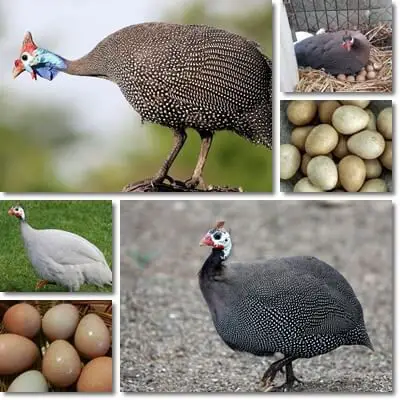Guinea fowl eggs are the eggs of several bird species known collectively as guinea fowl. Guinea fowl are native to Africa where wild populations can still be found, despite their rapidly declining numbers. But one species in particular, the helmeted guinea fowl (Numida meleagris) has been successfully domesticated and is now prevalent among backyard poultry all over the world. Some even prefer the noisy, tick-eating, fierce and sometimes feral guinea fowl to turkey, ducks or geese given their semblance to chicken. The eggs in particular are a commodity and often the main reason for keeping guinea fowl.
Frequently asked questions
1) How many eggs do guinea hens lay? If fed right (meaning left to roam freely and only fed small amounts of regular feed), hens may lay one egg a day or one egg every other day, more rarely every 2-3 days. So they are a lot like chickens in terms of egg laying productivity. Of course, enhanced feed can potentially cause an increase in egg production.

2) But do guinea hens lay eggs year round like chicken? No, they don’t. Guinea fowl egg laying starts in spring, usually in March-April and ends in fall, usually around October. Some hens can lay even 100 eggs in one season. Some may lay only 30-40 eggs, then go broody. 30 eggs is the usual number of eggs a hen prefers for nesting, but if her nest is disturbed in any way, she may change nests and continue to lay eggs until she meets her quota for nesting.
3) When do guinea hens start laying eggs? On average, the hen will start to lay eggs the earliest at 16-18 weeks or the latest at around 6 months. However, it’s to be expected the young guinea hens lay eggs the spring after they’ve been hatched, so in their second season. Ideally, the hens should enjoy a diet as close as possible to their natural one by being allowed to forage and receiving feed.
4) What do guinea fowl eat? Their diet includes grass, roots, flowers, fruits, vegetables, seeds, insects, spiders, flies, wasps, grasshoppers, ticks in particular, worms, small snails, frogs, snakes and others.
5) Are guinea fowl eggs edible? Yes, they are. You can eat guinea eggs just as you would chicken or any other backyard birds eggs. And they are just as good for you. The most notable differences are the eggs’ appearance and taste, which are quite similar to chickens’ but not quite the same.
Appearance
What do guinea fowl eggs look like? Similar to chicken eggs actually. Guinea fowl eggs size is about two thirds of a regular chicken egg, round at one end and very pointy at the other. Because of this, the egg appears to have a slight triangle shape. The shell is a lot thicker than that of chicken and the egg harder. Guinea eggs color is varied and ranges from white to light cream to different shades of tan (light to moderate yellowish-brown to reddish brown), sometimes with tiny brown speckles and indentations on the eggshell or discolored tan spots. If the hens lay the eggs outside in a nest in the ground, near a tree, it’s possible to mistake the egg for a rock. Compared to chicken eggs, guinea fowl eggs have a higher yolk ratio.
Taste and flavors
What do guinea fowl eggs taste like? Guinea fowl eggs taste really good, a lot like chicken eggs. Some people find them richer and more flavorful than chicken eggs, with denser egg yolks and prefer them to chicken. Others feel there is not much difference between them. Ideally, the birds should left to roam freely and forage for food, eat insects, seeds and plants in general to produce the best tasting eggs. Free range guinea fowl eggs have darker, deeper yellow-orange colored yolks. The egg white is a bit runnier because of the higher moisture content estimated at about 87%, second only to duck egg whites.

Guinea eggs nutrition facts
There is little information known about guinea fowl eggs nutritional value, but the increase in demand for both the birds and their eggs is prompting farmers, producers and nutrition experts to make relevant information available to consumers. According to the Journal of Environmental Science, Toxicology and Food Technology and the American Journal of Experimental Agriculture, the following nutrition facts are true for guinea fowl eggs:
1) Rich in protein. Whole guinea fowl egg is 10.1% to 13.5% protein, with the egg white providing significantly higher amounts of protein than the yolk. The eggs are a source of complete protein, meaning they provide all the essential amino acids the body requires to function optimally but cannot produce itself. They hold benefits for muscles and regulate brain activity by helping produce neurotransmitters that affect mood, appetite, sleep etc.
2) Rich in fat. Guinea fowl egg yolk is 32.2% to 32.7% fat. Little to no fat is present in the egg white. Guinea fowl eggs have more fat than domestic chicken varieties, but less fat than duck and goose eggs. The fat profile include both healthy amounts of unsaturated fatty acids such as Omega-3 fatty acids and saturated fats.
3) Guinea fowl eggs and Omega-3. It is presumed guinea eggs provide important amounts of Omega-3 fatty acids, similar to free range chicken eggs. This is because guinea fowl are quite feral poultry and like to roam, eat plenty of insects, small reptiles and even small mammals along with seeds, grass and fruits. Even when fed a conventional diet, they will still rely on foraging for most of their nutrition, hence the eggs’ good content of Omega-3. The fatty acid is known to provide benefits for the brain and, together with other fats in the yolk and protein in the whole egg, combat mental fatigue, support learning and memory and reduce brain fog.
4) Source of cholesterol. It is safe to assume that guinea fowl eggs are an important source of dietary cholesterol and theorized to contain slightly more cholesterol than domestic chicken, but a lot less than duck, goose and turkey and quail eggs. One whole guinea fowl egg (which is slightly smaller than a large chicken egg) can provide roughly half the recommended daily intake of cholesterol for an average adult on a 2,000 kcal a day diet, while 100 g of whole guinea eggs can provide the entire RDI of cholesterol. One or two eggs a day can be extremely healthy as the cholesterol in the yolks has a strong protective effect on the nervous system.
5) B vitamin profile. All eggs, guinea included, are animal products and will naturally contain important amounts of most, if not all essential B vitamins. Like all other egg varieties, guinea too provide the all-important vitamin B9 and vitamin B12, crucial for brain development of babies in the womb and preventive of degenerative diseases of the nervous system like multiple sclerosis. Other B vitamins in guinea eggs include thiamine (B1), riboflavin (B2), niacin (B3), pantothenic acid (B5) and pyridoxine (B6).
6) Rich in choline. Guinea fowl, duck, goose and free range chicken eggs are all rich sources of dietary choline, a B vitamin-like nutrient known for its benefits on the brain and nervous system. Preliminary research suggests choline deficiency is a risk factor for liver disease such as fatty liver disease, cardiovascular and neurological disorders. Dietary choline is especially important for pregnant women because it helps with brain and nervous system development of the baby in the womb as well as after birth. The nutrient in guinea fowl eggs is good for memory and shown to reduce the risk of neural tube defects of the brain, spinal cord and spine in newborn babies.
7) Source of vitamin A. Guinea fowl left to forage for food and only minimally sustained with conventional feed produce intense yellow-orange colored egg yolks that are rich in pro-vitamin A antioxidants like lutein, zeaxanthin and beta-carotene. Some of the benefits of these pro-vitamin A antioxidants include protecting the retina from sunlight radiation damage, promoting skin health and boosting immunity.
8) Minerals in guinea fowl eggs: sodium, potassium, calcium, magnesium, zinc, copper and iron. Existing research shows the eggs are good sources of several dietary minerals and contribute to cardiovascular function, notably better blood pressure levels (from potassium) and improved arrhythmia (from magnesium), strong bones and teeth (from calcium), reduced fatigue and elevated energy levels (from iron, magnesium and B vitamins) and better immunity (from zinc, copper and vitamin A).
Guinea fowl eggs may also contain vitamin D, phosphorus and trace amounts of vitamins E and K.
Guinea eggs vs chicken eggs
Guinea eggs compared to chicken eggs have a similar taste and appearance and provide a similar nutrition. It is likely though that guinea eggs nutritional profile is superior to that of domestic chicken fed a conventional diet and more similar to the nutritional profile of free range chicken due to their strong predisposition for foraging.
Also read Quail Eggs vs Chicken Eggs: Which is Better for Health?
And Goose Eggs vs Duck Eggs: What Is the Difference?
Below is a beautiful video showing the birds forage, followed by their unique guinea fowl screech and a short glimpse of their flight.
You can get guinea fowl eggs for sale from local farmers in your area or anyone with a backyard and a few guinea hens that is also willing to spare some eggs. If you are looking to get guinea fowl eggs for hatching, then know they need to be fertilized and as fresh as possible, ideally no older than a week or so. Egg incubation period ranges from 26-28 days to a month max. It’s usually best to get the eggs from local farmers near you or, even better, get the small chicks. Remember to keep them in an enclosed area for the first 10-16 weeks to give them the best start, protect them and prevent them from getting lost. If you want your other poultry to get along with the guineas, make their acquaintance while the guineas are still young, otherwise the guineas will have a hard time accepting the others.
Raising guinea fowl pros and cons
Here is some guinea fowl info to help you better understand the birds if you may be considering getting them:
1) Guineas are extremely noisy birds and will screech if they separate from one another, someone comes into the yard, a dog approaches them or if they simply don’t like another bird and want to teach it a lesson. They make excellent guard birds or alarm systems, but the noise can be overwhelming at times.
2) They eat ticks, spiders, grasshoppers, wasps, small frogs and even snakes. Their foraging is definitely a plus.
3) They are not nice birds. Guinea fowl are somewhat feral, untamed, intimidating and even aggressive towards other birds. They will pluck their feathers until bald and intimidate them into submission.
4) They roam and may get lost. Guinea fowl never stay at home. They leave and may sometimes forget to come back or get lost or eaten or hit by something. Even when they know where their home is, they may choose to sleep in tress instead of the chicken coop, nest in shrubs, bushes, on the ground somewhere, you name it. They also like to fly over the fence a lot.
5) Not the best mother hens. Some important guinea hen facts are that they are not good mother hens and may leave the nest as soon as the first few chicks hatch, despite having a lot of eggs left, and they will roam with the small chicks until they get them lost, wet (which is not good), hungry or eaten.
